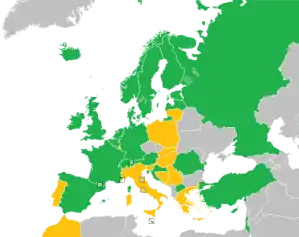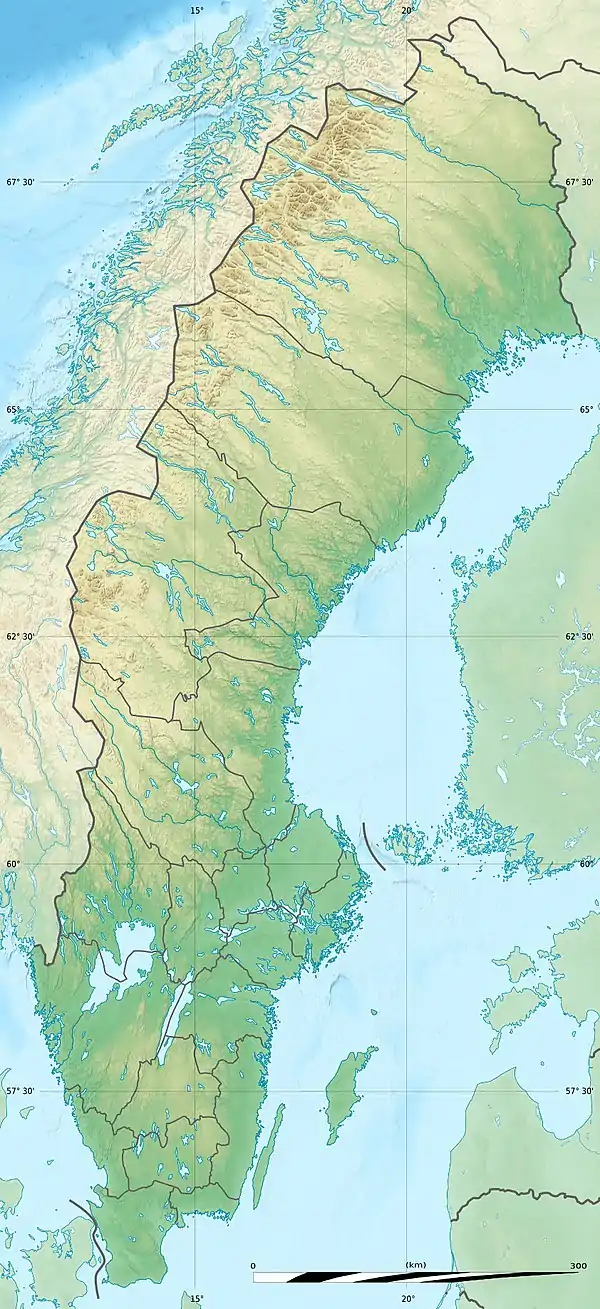Eurovision Song Contest 2000
The Eurovision Song Contest 2000 was the 45th edition of the annual Eurovision Song Contest. It took place in Stockholm, Sweden, following Charlotte Nilsson's win at the 1999 contest in Jerusalem with the song "Take Me to Your Heaven". The contest was held on 13 May 2000 at the Globe Arena. It was the first time since 1996 that the contest was held on mainland Europe. The contest was the second to be held in Stockholm, and the fourth held in Sweden. The presenters were Kattis Ahlström and Anders Lundin.
| Eurovision Song Contest 2000 | |
|---|---|
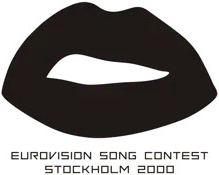 | |
| Dates | |
| Grand final | 13 May 2000 |
| Host | |
| Venue | Globe Arena Stockholm, Sweden |
| Presenter(s) | |
| Directed by | Marius Bratten |
| Executive supervisor | Christine Marchal-Ortiz |
| Executive producer | Svante Stockselius |
| Host broadcaster | Sveriges Television (SVT) |
| Interval act | "Once Upon a Time Europe Was Covered With Ice" film |
| Website | eurovision |
| Participants | |
| Number of entries | 24 |
| Debuting countries | |
| Returning countries | |
| Non-returning countries | |
Participation map
| |
| Vote | |
| Voting system | Each country awarded 12, 10, 8–1 point(s) to their 10 favourite songs |
| Nul points | None |
| Winning song | |
The winner of the 2000 contest was the Olsen Brothers who represented Denmark with the song "Fly on the Wings of Love" (originally: Smuk som et stjerneskud). The song was written by one of the brothers, Jørgen Olsen. On the day of their victory, Jørgen Olsen was 50 years and 61 days of age, making him the oldest artist yet to win the contest. However, he would not hold the record for long, as Dave Benton triumphed in the following year at the age of 50 years and 101 days, breaking the record by 40 days. The combined ages of The Olsen Brothers make them the oldest aged act ever to win the contest.[1] In a constrast with the recent years, the chosen venue was the big Globe Arena was, at the time, the biggest venue in space and the largest capacity place chosen to host the contest with a capacity of 16,000 spectators. The postcards used to introduce each country participating involved Swedish themes that incorporated each nation in some respect. All the postcards are filmed in Stockholm, Sweden, however, the only exception is the postcard for Sweden, which is filmed before Expo 2000 in Hanover, Germany. The logo for the contest, a pair of open mouth lips, was chosen by SVT, and was described by its designers as "a sensual, yet stylistically pure mouth representing song, dialogue and speech", and was later one of the possible choices for the generic logo introduced at the 2004 Contest.[2]
The favourite in this year's contest was Estonia, who was also a fan favourite and praised by the press.[2] However, as the voting results came in, Denmark immediately took control of the scoreboard, beating Russia into second place and Latvia into 3rd place. Slovakia, Greece and Hungary decided not to compete for financial reasons.[2] The countries with the five lowest average scores over the previous five contests who had participated in 1999, Bosnia and Herzegovina, Lithuania, Poland, Portugal and Slovenia were excluded meaning that five countries could return. These countries were: Finland, North Macedonia, Romania, Russia and Switzerland. Latvia also joined the contest as the only country to debut.
For the first time, an official CD compilation was released; it contained all of the songs of the participating nations and was available throughout Europe.[2] Such a disc was attempted in the previous year, however it lacked four of the competing songs. Sponsored by Microsoft, the contest was also broadcast in Australia, Canada, Japan and the United States via the internet for the first time.
Location

SVT announced on 7 July 1999 that the contest would be hosted by the Globe Arena in Stockholm. Other possible candidates had been Scandinavium in Gothenburg and the small Malmömässan in Malmö. They had previously hosted Eurovision Song Contest 1985 and 1992 respectively. The Globe was said to be chosen due his size and because Stockholm had not hosted the contest since 1975 and that it would be somewhat cheaper than the other options.[3]
Format
Design
The graphic design programme for this year's contest was developed by Stockholm Design Lab and was centred around a stylised mouth symbol. It was given the Excellent Swedish Design award later that year.[4] The softness of the mouth was contrasted with a pointy typeface, made specifically for the contest. During each performance, a distorted version of each performing country's flag would be shown within the mouth next to the stage.
Interval act
The intermission during the finale of the ESC was "Once Upon a Time Europe Was Covered With Ice", a movie/song directed, composed and edited by Johan Söderberg and produced by John Nordling.[5] For the film Söderberg had traveled all over Europe to record children performing the score. On stage were violinist Caroline Lundgren (who appeared during the opening dressed in a traditional Swedish costume and exclaimed “Welcome Europe!"), drummer Strängnäs Trumkorps plus street musicians from Stockholm and dancers from the Bounce Streetdance Company.
Incidents
There were some controversies concerning some participating countries. Israel, who opened the contest, entered a group who waved Israeli and Syrian flags advocating peace between the two nations. The two male singers in the group also ran up to each other and kissed for a brief moment. The Russian delegation petitioned for the winning Olsen Brothers to be disqualified, after they had used a vocoder to give Jørgen Olsen an electronic sound to his voice, during one of the verses of their performance. (Even though Russia themselves awarded Denmark maximum 12 points.) This issue was rejected by the European Broadcasting Union (EBU).[2]
In the Netherlands, NOS decided to take the Contest off air halfway through because of the Enschede fireworks disaster that happened earlier that day, so it could use the channel for continuous news broadcasts. Later, NOS declared that it was both for practical reasons as well as because they found it "inappropriate to broadcast a light entertainment programme on the night of such a catastrophic event". As a result, televoting had to be suspended and the Dutch votes were given by a stand-by jury instead.[2] The contest was later rebroadcast in full.
Returning artists
Lead artists
| Artist | Country | Previous year(s) |
|---|---|---|
| Alexandros Panayi (part of Voice) | 1995 | |
| Roger Pontare | 1994 (in a duet with Marie Bergman) | |
| Stefan Raab | 1998 (as "conductor" for Germany) | |
| Eamonn Toal | 1995 (as a backing vocalist for Eddie Friel) | |
| Serafín Zubiri | 1992 | |
Backing performers
| Artist[6] | Country | Previous year(s) |
|---|---|---|
| Al Bano | 1976, 1985 (both for | |
| Frank Ådahl | 1990 (as a member of Edin-Ådahl) | |
| Gabriel Forss | 1997 (as a member of Blond, representing | |
| Eyjólfur Kristjánsson | 1991 (with Stefán Hilmarsson) |
Results
Draw for the running order took place on 21 November 1999.[7]
Scoreboard
According to the EBU rules of the 45th Eurovision Song Contest 2000 (published on 23 September 1999), all participating countries should have used televoting, where the top ten most voted for songs were awarded the 12, 10, 8, 7, 6, 5, 4, 3, 2, 1 point(s). In the televoting household shall not be permitted to vote more than three times. In exceptional circumstances where televoting was not possible, a jury was used instead:[9] Russia, Macedonia, Turkey and Romania.
The Dutch votes were the votes of the backup jury due to interrupted broadcasting of the contest in the Netherlands because of the fireworks disaster in the Dutch city of Enschede.
| Voting procedure used: 100% Televoting 100% Jury vote |
Voters | |||||||||||||||||||||||||
|---|---|---|---|---|---|---|---|---|---|---|---|---|---|---|---|---|---|---|---|---|---|---|---|---|---|---|
| Israel | 7 | 6 | 1 | |||||||||||||||||||||||
| Netherlands | 40 | 8 | 2 | 5 | 8 | 5 | 1 | 4 | 1 | 2 | 3 | 1 | ||||||||||||||
| United Kingdom | 28 | 1 | 2 | 3 | 6 | 3 | 4 | 3 | 6 | |||||||||||||||||
| Estonia | 98 | 6 | 7 | 4 | 6 | 7 | 4 | 2 | 6 | 5 | 4 | 5 | 6 | 6 | 8 | 10 | 2 | 7 | 3 | |||||||
| France | 5 | 2 | 3 | |||||||||||||||||||||||
| Romania | 25 | 6 | 7 | 12 | ||||||||||||||||||||||
| Malta | 73 | 3 | 1 | 2 | 1 | 7 | 2 | 8 | 1 | 8 | 1 | 3 | 3 | 8 | 3 | 8 | 4 | 5 | 3 | 2 | ||||||
| Norway | 57 | 7 | 3 | 3 | 3 | 7 | 7 | 7 | 6 | 10 | 4 | |||||||||||||||
| Russia | 155 | 10 | 8 | 10 | 5 | 12 | 12 | 8 | 7 | 12 | 8 | 5 | 6 | 4 | 2 | 12 | 5 | 7 | 5 | 10 | 7 | |||||
| Belgium | 2 | 2 | ||||||||||||||||||||||||
| Cyprus | 8 | 1 | 3 | 4 | ||||||||||||||||||||||
| Iceland | 45 | 5 | 6 | 7 | 12 | 8 | 7 | |||||||||||||||||||
| Spain | 18 | 5 | 2 | 10 | 1 | |||||||||||||||||||||
| Denmark | 195 | 12 | 10 | 12 | 8 | 7 | 1 | 8 | 10 | 12 | 10 | 4 | 12 | 10 | 12 | 10 | 12 | 10 | 12 | 1 | 12 | 10 | ||||
| Germany | 96 | 8 | 5 | 10 | 3 | 4 | 6 | 6 | 12 | 2 | 12 | 1 | 2 | 8 | 5 | 12 | ||||||||||
| Switzerland | 14 | 6 | 5 | 2 | 1 | |||||||||||||||||||||
| Croatia | 70 | 8 | 8 | 10 | 2 | 6 | 6 | 10 | 6 | 8 | 6 | |||||||||||||||
| Sweden | 88 | 6 | 5 | 1 | 4 | 5 | 5 | 4 | 6 | 10 | 8 | 3 | 6 | 7 | 12 | 6 | ||||||||||
| Macedonia | 29 | 10 | 7 | 2 | 10 | |||||||||||||||||||||
| Finland | 18 | 5 | 7 | 4 | 2 | |||||||||||||||||||||
| Latvia | 136 | 4 | 4 | 7 | 12 | 3 | 12 | 1 | 12 | 1 | 10 | 7 | 8 | 7 | 7 | 10 | 3 | 12 | 8 | 8 | ||||||
| Turkey | 59 | 12 | 12 | 1 | 3 | 1 | 10 | 5 | 1 | 5 | 4 | 5 | ||||||||||||||
| Ireland | 92 | 2 | 3 | 10 | 4 | 4 | 2 | 10 | 6 | 4 | 7 | 2 | 3 | 5 | 8 | 5 | 4 | 1 | 1 | 7 | 4 | |||||
| Austria | 34 | 1 | 2 | 3 | 8 | 2 | 4 | 3 | 5 | 4 | 2 | |||||||||||||||
12 points
Below is a summary of all 12 points in the final:
| N. | Contestant | Voting nation |
|---|---|---|
| 8 | ||
| 4 | ||
| 3 | ||
| 2 | ||
| 1 | ||
Qualification for the 2001 contest
In addition to the Big Four and the host country of the 2001 contest, Denmark, the 12 countries with the highest average scores between 1996 and 2000 were allowed to take part in the Eurovision Song Contest 2001.
Key:
Automatically qualified
Qualified
| Rank | Country | Average | Score | ||||
|---|---|---|---|---|---|---|---|
| 1996 | 1997 | 1998 | 1999 | 2000 | |||
| 1 | 136.00 | 136 | |||||
| – | 107.20 | 77 | 227 | 166 | 38 | 28 | |
| 2 | 98.60 | 162 | 157 | 64 | 18 | 92 | |
| – | 97.00 | 25 | 71 | 195 | |||
| 3 | 94.00 | 33 | 155 | ||||
| 4 | 90.67 | 172 | 93 | 7 | |||
| 5 | 88.00 | 100 | 36 | 53 | 163 | 88 | |
| – | 86.00 | 22 | 86 | 140 | 96 | ||
| 6 | 80.80 | 68 | 66 | 165 | 32 | 73 | |
| 7 | 80.40 | 98 | 24 | 131 | 79[lower-alpha 1] | 70 | |
| 8 | 80.00 | 94 | 82 | 36 | 90 | 98 | |
| 9 | 68.80 | 78 | 5 | 150 | 71 | 40 | |
| 10 | 65.00 | 51 | 18 | 146 | 45 | ||
| 11 | 57.00 | 114 | 0 | 79 | 35 | 57 | |
| 12 | 56.60 | 57 | 121 | 25 | 21 | 59 | |
| 13 | 46.00 | 22 | 122 | 38 | 2 | ||
| 14 | 44.75 | 68 | 12 | 65 | 34 | ||
| 15 | 43.40 | 72 | 98 | 37 | 2 | 8 | |
| – | 30.60 | 17 | 96 | 21 | 1 | 18 | |
| – | 27.00 | 18 | 95 | 3 | 14 | 5 | |
| 16 | 22.50 | 16 | 29 | ||||
| 17 | 16.33 | 9 | 22 | 18 | |||
| 18 | 15.50 | 6 | 25 | ||||
| 19 | 10.25 | 22 | 5 | 0 | 14 | ||
International broadcasts and voting
Sponsored by Microsoft, the contest was also broadcast in Canada, Australia, Japan, the United States and all 18 European MSN sites via the internet for the first time.[10]
Voting and spokespersons
The spokespersons announced the score from their respective country's televote (or, in some cases, national jury) in running order.
 Israel – Yoav Ginai (Winner of the 1998 contest, as lyricist)[11]
Israel – Yoav Ginai (Winner of the 1998 contest, as lyricist)[11] Netherlands – Marlayne (Dutch representative in 1999)
Netherlands – Marlayne (Dutch representative in 1999) United Kingdom – Colin Berry
United Kingdom – Colin Berry Estonia – Evelin Samuel (Estonian representative in 1999)[12]
Estonia – Evelin Samuel (Estonian representative in 1999)[12] France – Marie Myriam (Winner of the 1977 contest)[13]
France – Marie Myriam (Winner of the 1977 contest)[13] Romania – Andreea Marin
Romania – Andreea Marin Malta – Valerie Vella[14]
Malta – Valerie Vella[14] Norway – Marit Åslein
Norway – Marit Åslein Russia – Zhanna Agalakova
Russia – Zhanna Agalakova.svg.png.webp) Belgium – Thomas Van Hamme[13]
Belgium – Thomas Van Hamme[13].svg.png.webp) Cyprus – Loukas Hamatsos[15]
Cyprus – Loukas Hamatsos[15] Iceland – Ragnheiður Elín Clausen
Iceland – Ragnheiður Elín Clausen Spain – Hugo de Campos
Spain – Hugo de Campos Denmark – Michael Teschl (Danish representative in 1999)[16]
Denmark – Michael Teschl (Danish representative in 1999)[16] Germany – Axel Bulthaupt
Germany – Axel Bulthaupt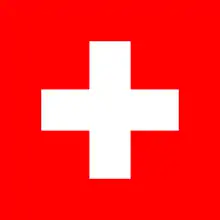 Switzerland – Astrid Von Stockar
Switzerland – Astrid Von Stockar Croatia – Marko Rašica[17]
Croatia – Marko Rašica[17] Sweden – Malin Ekander[18]
Sweden – Malin Ekander[18] Macedonia – Sandra Todorovska[19]
Macedonia – Sandra Todorovska[19] Finland – Pia Mäkinen[20]
Finland – Pia Mäkinen[20] Latvia – Lauris Reiniks (Latvian representative in 2003 as part of F.L.Y.)
Latvia – Lauris Reiniks (Latvian representative in 2003 as part of F.L.Y.) Turkey – Osman Erkan
Turkey – Osman Erkan Ireland – Derek Mooney
Ireland – Derek Mooney Austria – Dodo Roščić
Austria – Dodo Roščić
Commentators
Most countries sent commentators to Stockholm or commented from their own country, in order to add insight to the participants and, if necessary, the provision of voting information.
Participating countries
 Austria – Andi Knoll (ORF1), Stermann & Grissemann (FM4)[21]
Austria – Andi Knoll (ORF1), Stermann & Grissemann (FM4)[21].svg.png.webp) Belgium – French: Jean-Pierre Hautier (RTBF La Une),[22] Dutch: André Vermeulen and Anja Daems (VRT TV1)[23]
Belgium – French: Jean-Pierre Hautier (RTBF La Une),[22] Dutch: André Vermeulen and Anja Daems (VRT TV1)[23] Croatia – Aleksandar "Aco" Kostadinov (HRT 1)[24]
Croatia – Aleksandar "Aco" Kostadinov (HRT 1)[24].svg.png.webp) Cyprus – Evi Papamichail (RIK 1)[15]
Cyprus – Evi Papamichail (RIK 1)[15] Denmark – Keld Heick (DR1)[16]
Denmark – Keld Heick (DR1)[16] Estonia – Marko Reikop (ETV)[25]
Estonia – Marko Reikop (ETV)[25] Finland – Jani Juntunen (Yle TV1)[26]
Finland – Jani Juntunen (Yle TV1)[26] France – Julien Lepers (France 3)[22]
France – Julien Lepers (France 3)[22] Germany – Peter Urban (Das Erste),[27] Thomas Mohr (Deutschlandfunk/NDR 2)[28]
Germany – Peter Urban (Das Erste),[27] Thomas Mohr (Deutschlandfunk/NDR 2)[28] Iceland – Gísli Marteinn Baldursson (Sjónvarpið)[29]
Iceland – Gísli Marteinn Baldursson (Sjónvarpið)[29] Ireland – Marty Whelan (RTÉ One),[30] Larry Gogan (RTÉ Radio 1)
Ireland – Marty Whelan (RTÉ One),[30] Larry Gogan (RTÉ Radio 1) Israel – No commentator
Israel – No commentator Latvia – Kārlis Streips (LTV)
Latvia – Kārlis Streips (LTV) Macedonia – Milanka Rašik (MTV 1)
Macedonia – Milanka Rašik (MTV 1) Malta – Charlo Bonnici (TVM)
Malta – Charlo Bonnici (TVM) Netherlands – Willem van Beusekom (TV2),[31] Hijlco Span (Radio 2)
Netherlands – Willem van Beusekom (TV2),[31] Hijlco Span (Radio 2) Norway – Jostein Pedersen (NRK1),[32] Stein Dag Jensen (NRK P1)
Norway – Jostein Pedersen (NRK1),[32] Stein Dag Jensen (NRK P1) Romania – Leonard Miron (TVR1)[33]
Romania – Leonard Miron (TVR1)[33] Russia – Alexey Zhuravlev and Tatiana Godunova (Public Russian Television)
Russia – Alexey Zhuravlev and Tatiana Godunova (Public Russian Television) Spain – José Luis Uribarri (TVE1)[34]
Spain – José Luis Uribarri (TVE1)[34] Switzerland – German: Sandra Studer (SF2), French: Jean-Marc Richard (TSR 1), Italian: Jonathan Tedesco (TSI 1)
Switzerland – German: Sandra Studer (SF2), French: Jean-Marc Richard (TSR 1), Italian: Jonathan Tedesco (TSI 1) Sweden – Pernilla Månsson Colt and Christer Lundh (SVT2),[18] Carolina Norén (SR P3)[35]
Sweden – Pernilla Månsson Colt and Christer Lundh (SVT2),[18] Carolina Norén (SR P3)[35] Turkey – Ömer Önder (TRT 1)[36]
Turkey – Ömer Önder (TRT 1)[36] United Kingdom – Terry Wogan (BBC One), Ken Bruce (BBC Radio 2)
United Kingdom – Terry Wogan (BBC One), Ken Bruce (BBC Radio 2)
Non-participating countries
.svg.png.webp) Australia – N/A (SBS TV)
Australia – N/A (SBS TV)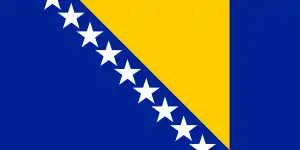 Bosnia and Herzegovina – Ismeta Dervoz-Krvavac (BHT)
Bosnia and Herzegovina – Ismeta Dervoz-Krvavac (BHT) Greece – Dafni Bokota (ET1)[37]
Greece – Dafni Bokota (ET1)[37] Japan – No commentator. The contest aired on July 14, 2000. (NHK-BS2)[38]
Japan – No commentator. The contest aired on July 14, 2000. (NHK-BS2)[38].svg.png.webp) Lithuania – Ramūnas Česonis & Vilija Grigonytė (LTV)
Lithuania – Ramūnas Česonis & Vilija Grigonytė (LTV) Poland – Artur Orzech (TVP1)[39]
Poland – Artur Orzech (TVP1)[39] Portugal – Eládio Clímaco (RTP1)[40]
Portugal – Eládio Clímaco (RTP1)[40] Slovenia – Miša Molk (SLO1)
Slovenia – Miša Molk (SLO1)%253B_Flag_of_Serbia_and_Montenegro_(2003%E2%80%932006).svg.png.webp) FR Yugoslavia – There was no broadcast of the contest live, but Third channel of RTS aired just all the performances except for Israeli performance, and the winning performance, without voting sequence. (RTS 3K)[41]
FR Yugoslavia – There was no broadcast of the contest live, but Third channel of RTS aired just all the performances except for Israeli performance, and the winning performance, without voting sequence. (RTS 3K)[41]
Official album
| Eurovision Song Contest: Stockholm 2000 | ||||
|---|---|---|---|---|
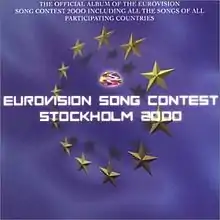 | ||||
| Compilation album by | ||||
| Released | 13 May 2000 | |||
| Genre | Pop | |||
| Length | 71:36 | |||
| Label | EMI / CMC | |||
| Eurovision Song Contest chronology | ||||
| ||||
Eurovision Song Contest: Stockholm 2000 was the official compilation album of the 2000 Contest, put together by the European Broadcasting Union and released by EMI Records and CMC International on 13 May 2000.[42] The album featured all 24 songs that entered in the 2000 contest, and was the first time that the EBU had produced such merchandise.[43]
Charts
| Chart (2000) | Peak position |
|---|---|
| German Compilation Albums (Offizielle Top 100)[44] | 3 |
Notes and references
Notes
- Croatia scored 118 points in the 1999 contest, however due to controversy surrounding its usage of pre-recorded vocals in the live performance, its score was reduced by a third for the purpose of calculating the five-year average to determine participation in future contests.
References
- O'Connor, John Kennedy. The Eurovision Song Contest - The Official Celebration. Carlton Books, 2015. ISBN 978-1-78097-638-9. Pages 32-33
- Bakker, Sietse (2009-12-21). "The end of a decade: Stockholm 2000". European Broadcasting Union. Retrieved 21 December 2009.
- "Eurovision Song Contest 2000 placeras i Stockholm" (Press release). Sveriges Television. July 5, 1999. Archived from the original on 2003-01-14.
- "Fin form från webbdesign till tofflor". Sydsvenskan. January 21, 2001.
- Johan Söderberg CV at hammarbyartport.com. Archived April 26, 2012, at the Wayback Machine
- "2000". Diggiloo.net. Retrieved 7 December 2020.
- http://www.myledbury.co.uk/eurovision/pdf/esc2000.pdf
- "Eurovision Song Contest 2000". The Diggiloo Thrush. Retrieved 5 March 2012.
- "Rules of Eurovision Song Contest 2000" (PDF). Myledbury. Retrieved 9 November 2014.
- Guardian Staff (May 4, 2000). "Microsoft is going for a song" – via www.theguardian.com.
- "פורום אירוויזיון". Sf.tapuz.co.il. 1999-09-13. Archived from the original on October 8, 2011. Retrieved 2012-08-09.
- Archived August 22, 2011, at the Wayback Machine
- "Concours Eurovision de la Chanson • Consulter le sujet – Porte-paroles des jurys des pays francophones". Eurovision.vosforums.com. Retrieved 2012-08-09.
- Bayliss, Marc Calleja (24 January 2016). "Breaking News: And the Spokesperson Is". www.escflashmalta.com. Archived from the original on 19 March 2012.
- Savvidis, Christos (OGAE Cyprus)
- "Forside". esconnet.dk. Archived from the original on 2012-03-24. Retrieved 2012-08-09.
- "Pogledaj temu – SPOKESPERSONS". Forum.hrt.hr. 2008-02-29. Archived from the original on 2012-03-14. Retrieved 2012-08-09.
- "Infosajten.com". Infosajten.com. Archived from the original on July 18, 2012. Retrieved 2012-08-09.
- "ESCforum.net". ESCforum.net. Retrieved 2012-08-09.
- "Selostajat ja taustalaulajat läpi vuosien? • Viisukuppila". Viisukuppila.fi. Retrieved 2012-08-09.
- "Song Contest mit Stermann & Grissemann". wien ORF.at. 2012-05-01. Retrieved 2012-09-29.
- Christian Masson. "2000 – Stockholm". Songcontest.free.fr. Retrieved 2012-08-09.
- "Congratulations: 50 jaar Songfestival!". VRTFansite.be. Archived from the original on 2012-03-25. Retrieved 2012-08-09.
- "Pogledaj temu – POVIJEST EUROSONGA: 1956–1999 (samo tekstovi)". Forum.hrt.hr. 2009-05-15. Archived from the original on 2014-01-07. Retrieved 2012-08-09.
- "Estonia: Sahlene to be ETV's spokeperson [sic]". Archived from the original on September 2, 2011. Retrieved February 7, 2016.
- "Selostajat ja taustalaulajat läpi vuosien? • Viisukuppila". Viisukuppila.fi. Retrieved 2012-08-09.
- "Dr. Peter Urban kommentiert – Düsseldorf 2011". Duesseldorf2011.de. Archived from the original on 2012-03-24. Retrieved 2012-08-09.
- "Thomas Mohr: Mit Dschinghis Khan im Garten". Eurovision.de. 2011-05-14. Archived from the original on 2013-04-12. Retrieved 2012-10-28.
- "Dagblaðið Vísir – DV, 13 May 2000". Timarit.is. Retrieved 2012-08-09.
- "RTÉ so lonely after loss of Gerry – Marty". 20 May 2010. Retrieved 29 May 2010.
He has been providing commentary for Irish viewers since 2000 and maintains great enthusiasm for the much lampooned contest.
- "Welkom op de site van Eurovision Artists". Eurovisionartists.nl. Retrieved 2012-08-09.
- "Alt du trenger å vite om MGP – Melodi Grand Prix – Melodi Grand Prix – NRK". Nrk.no. 2003-05-27. Retrieved 2012-08-09.
- "Leonard Miron iubeşte de 10 ani acelaşi bărbat". Libertatea.ro. 2013-02-26. Retrieved 2018-08-27.
- "FORO FESTIVAL DE EUROVISIÓN • Ver Tema – Uribarri comentarista Eurovision 2010". Eurosongcontest.phpbb3.es. Archived from the original on 2012-03-17. Retrieved 2012-08-09.
- "Swedes stay at home with Eurovision fever". The Local. 2009-05-16. Archived from the original on 2013-05-15. Retrieved 2012-09-29.
- 2000 Spain televoting results. YouTube. 19 April 2007.
- "Η Δάφνη Μπόκοτα και η EUROVISION (1987–2004)". Retromaniax.gr. Archived from the original on 2012-09-12. Retrieved 2012-08-09.
- "金曜特集 | 番組表検索結果詳細". NHKクロニクル.
- "Zobacz temat – Eurowizyjna gra". Eurowizja.Com.Pl. Archived from the original on 2012-03-23. Retrieved 2012-08-09.
- "Comentadores Do ESC – escportugalforum.pt.vu | o forum eurovisivo português". 21595.activeboard.com. Archived from the original on April 21, 2012. Retrieved 2012-08-09.
- "Nostalgični RTV press clipping". rtvforum.net. Archived from the original on 2015-09-29. Retrieved 2015-09-02.
- "Eurovision Song Contest: Stockholm 2000". allmusic.com. Allmusic. Retrieved 5 November 2014.
- "Eurovision Song Contest 2000". Eurovision.tv. Retrieved 2012-08-09.
- "Eurovision Song Contest 2000". Offiziellecharts.de. GfK Entertainment Charts. Retrieved 17 March 2018.
External links
| Wikimedia Commons has media related to Eurovision Song Contest 2000. |
